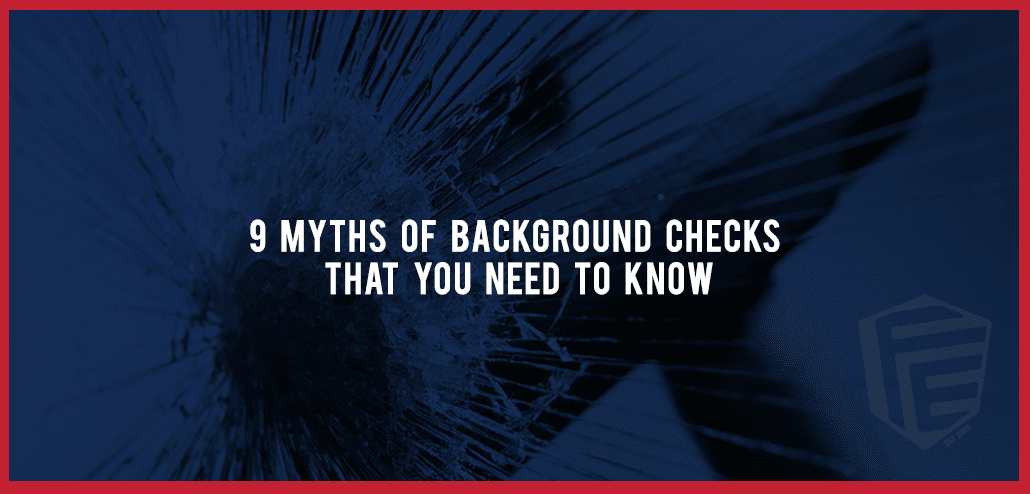9 Background Check Myths You Need To Know
By Monica Pappas
Chances are you have been or will be fingerprinted at some point in your life. Fingerprinting is not only for criminals. There are several jobs and volunteering opportunities that people may not do if they have disqualifying criminal records. For example, someone with a grand larceny record may not do anything related to financial transactions. Someone with sex crimes or a record of abuse may not be around the disabled, elderly or children. Someone that has a history of neglect should not care for others. While fingerprinting these civilians may be inconvenient, these laws are put into place to protect our most vulnerable populations.
#1 In Home Service Companies Don’t Hire Criminals
In Nevada, the Contractor holding a state Contractor’s License must be fingerprinted but their staff is not required to complete fingerprint background checks. Think of all the times you hired AC/Heating professionals, Plumbers or an Electrician to come to your house to fix something. Chances are they are not fingerprint background checked. While the company may require a name and date of birth background check, if a person isn’t forthcoming with their correct information including their name and date of birth, the criminal history will not be known to the company running a background check other than a fingerprint background check.
#2 Everyone Around Children Have Fingerprint Background Checks Completed
While this absolutely should be true, it is not. Currently, there is a federal law, the Adam Walsh Act, which does require anyone around children to complete a fingerprint background check before they have access to kids. Unfortunately, states generally do not have enforcement of this federal law. Extra-Curricular Volunteers, Sunday School Teachers, Coaches and other group leaders may not be compliant with this national law set in place to protect our kids from predators with priors. It seems that we have to wait for something bad to happen in order to enforce these important steps to protect our children. It is important to ask about the type of background check that was performed on the adults that we entrust our children to.
#3 All Background Checks Are Created Equal.
This could not be further from the truth. Not all background checks and criminal checks are equal. Multi-Jurisdictional Background Checks are commonly known as “background screening” and Name and Date of Birth “Background Checks”. The National Criminal Databases, also known as a multi-jurisdictional search, is a database of criminal records collected from public databases that are held by a private company and, as such, those databases are unique to the company hosting the database. Not all states allow these companies to purchase the sex offender registry, and in turn, offer or sell that information for profit. There is no denying that the FBI has the largest criminal database that does include the sex offender registry. If the check doesn’t say “fingerprint background check” then that biometric data did not verify that individual and their criminal record.
#4 Background Screening Without Fingerprints Will Always Show Crime(s) Committed.
According to the National Association of Professional Background Screeners (NAPBS) website, only 55 percent of court records across the U.S. can be accessed online through multi-jurisdictional databases which typically contain just seven years of history. Conversely, Fingerprint Background Checks go back to age 18 and, no matter what alias or date of birth the criminal has used, the criminal fingerprint booking report in the FBI database will populate. In March 2017, a child care operator was arrested in the USA for leaving seven young children, ages six months to 4 years, alone at her childcare facility to go tanning. Upon being arrested and facing 21 charges, including neglect, it was discovered that she had priors in 2014. Because she changed her name after 2014, her prior record did not show up on the all too common “background check”.
#5 The FBI Database Isn’t Accurate
This was a hot topic when Uber and Lyft made their National push. In 2015, these companies lobbied that the FBI database was not complete. They argued that while a person may be charged with a crime, the follow-up of the outcome of the case was not updated in the FBI database. This old information was spread by the ride-sharing companies as they quoted the U.S. Attorney General Published Report from 2006, which stated that only 50 percent of arrest records in AIFIS (FBI database) have a final disposition. Meaning, someone was arrested but the record may not show if charges were dropped. However, unlike what was being shared by these popular ride-sharing companies, they failed to give the public the full quote as it went on to say, “Nevertheless, while far from complete, [FBI database] is the most comprehensive single source of criminal history information in the United States and provides users, at minimum, with a pointer system that assists in discovering more complete information on a person’s involvement with the criminal justice system.”
After this report was published in 2006, the FBI further strengthened their background check process and database, creating the Next Generation Identification System (NGI). This new implementation took the FBI eight years to complete. The NGI system links 18,000 local and state law enforcement agencies that are fully reporting back to the FBI on various levels.
#6 Private Companies Providing Hiring Services Never Use Fingerprint Background Checks
Name and date-of-birth background checks should not be considered up-to-date in all jurisdictions. If a criminal record is identified, further verification may be required by the Fair Credit Reporting Act (FCRA) to confirm the subject’s identity, verify the accuracy of information and determine the current disposition of the criminal case – all of which would need to be verified by a fingerprint background check. This also comes into play when a criminal has the same name and date of birth as you, their criminal record may report as crimes you committed. To clear up this misunderstanding you will be asked to have a fingerprint background check to show you were never booked and charged with those crimes.
#7 Fingerprint Background Checks Take Too Long For Results
It is true the old fashioned ink and mailing in a fingerprint card may take months for results the new technology of Livescan allows a much faster process. Someone at the FBI has to manually scan the fingerprint card. When fingerprints are sent via Livescan, the process is much faster and in some cases, we have had fingerprint background checks render much faster than other background checks. I personally have had an FBI fingerprint criminal record in a customer’s hands within 45 minutes after fingerprinting them. I found it interesting when a few distribution companies had delays retaining talent to hire because their normal name and date of birth background checks were taking longer than three weeks for the results. Their prospects were finding other employment in the timeframe the normal name and date of birth background checks were lagging.
#8 Identical Twins Have Identical Everything
While identical twins will have the same DNA, they will have different fingerprint patterns.
#9 Animals Do Not Have Fingerprints
Some animals do have fingerprints similar to human fingerprints. Koala Bears do have fingerprint patterns similar to human fingerprints.






















